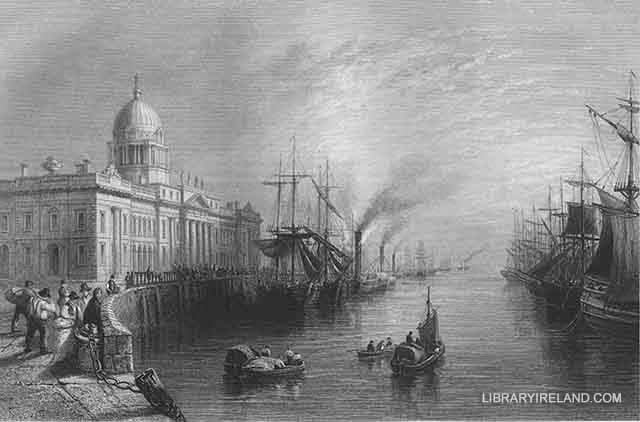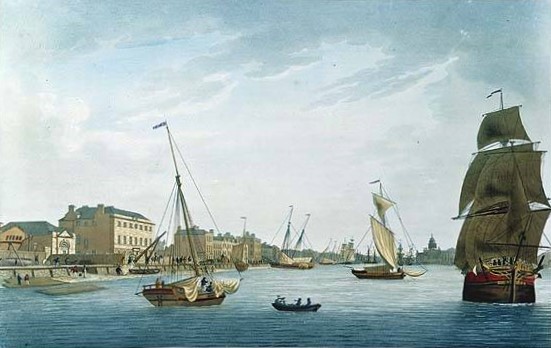“I am satisfied, that a knowledge of the art of swimming would be far more useful to the rising generation, than many accomplishments which are at present taught at a very great expense.” – Roger Lamb (1811)
It happens every year: as soon as there is a hint of sunshine the young people of the Dockland communities take to the river, and dive, leap and somersault into the arms of Anna Livia. There are of course though who tut tut and question the safety of this act, and there has in the past been some unpleasant occurrences. However, those engaged in the sport of recklessly projecting themselves towards the water are part of a long standing local tradition. It is possible that their parents, their grand-parents and even their great grand-parents behaved similarly, and in fact there is evidence that this recreation was taking place at least 250 years ago. What follows is the opening paragraphs of “Memoir of his own life” , written by Roger Lamb , and first published in 1811, in which the author describes his near death experience on the Liffey (in 1862).
“I drew my first breath in the city of Dublin, on the 17th of January 1756, of humble, industrious, and virtuous parents. I was the youngest of eleven children. My eldest brother sacrificed his life in the defence of his country: he died in consequence of a wound which he received on board one of the king’s ships. At the time of his death I was only five years old; but I remember that my father was greatly afflicted at it: and the more so, when he found my inclination of mind was also to the sea. Considering his situation, which though reputable, was far from affluent, and the labour necessary to support his family; he was a man of much reading, which strong narrative powers of intellect had led him to digest and methodize. He was far from being unacquainted with seafaring matters. I well remember, when a child, walking with him down the North Wall, he would describe to me, in the most interesting manner, a naval engagement, and by the most apt and familiar transition, turn the discourse to the battles which were then fighting between the English and the French. I am aware that my father’s motive, while he amused me in these conversations, was to instruct: but he little imagined, that in so doing, he was kindling a martial ardour in my young breast, which might, and ultimately did lead my heedless steps into very dangers he would have wished me to shun, and against which he would have guarded me with fondest anxiety. At length he began to perceive his error: for when he discovered my attention engrossed by these subjects, with tears I his eyes, he would say,” Ah, my dear child, I see your little breast is fired with this account. I only relate these things to inform your judgement. I have lost one fine boy already fighting for his country. Surely you will never leave your father. You must stay with me and your mother; and be our support and comfort in our old days.” Much as I loved my father, and deep as these affectionate speeches sunk in my mind; they had a tendency which he little imagined when he first used them. It was from these discourses of my father that an anxious desire was first raised in my mind for a seafaring life.
Our house being on the river Liffey, I was a constant frequenter of its quays, and the places where shipping were moored. There I soon acquired the art of climbing up the masts of vessels. At the age of six years I began to practice the art of swimming; but by my temerity, I was near losing my life at that tender period. This circumstance occurred in the old dock, near the spot where the new Custom House now stands. The tide was full in, and in imitation of some grown lads, who practised these leaps, as feats of activity, I jumped from off the steps. I soon, however found, that what I had thought swimming, in shallow water, was but the paddling of a child: for I sunk like a stone, in nearly ten feet of water. Among the spectators, providentially for me, were many expert swimmers; one of whom observing that I did not rise to the surface of the water, immediately plunged in and took me up, almost dead. This circumstance, far from deterring me from going again into the water, only made me more eager to acquire perfection in the art of swimming, in which, after some time, I became such a proficient, that from off the bowsprits and round-tops of ships, I frequently leaped head foremost into the river. I now recollect the dangers to which I exposed myself on the watery element, even before I had attained my ninth year!
I recognise with gratitude, the protecting arm divine, and, in humble adoration of that Providence which hitherto guided me in safety, through the progress of an eventful life, am led to say with the poet,
“Oft hath the sea confest thy power,
And given my back to thy command;
It could not, Lord! My life devour,
Safe in the hollow of thy hand.”
It may be necessary here to remark, that the dangers into which boys precipitate, in learning to swim, might for the most part, be avoided, by choosing places, where grown persons should attend, and protect them from danger, while they taught then the practice. I am satisfied, that a knowledge of the art of swimming would be far more useful to the rising generation, than many accomplishments which are at present taught at a very great expense. But until something of this kind is established, I may be permitted to remark, how necessary it is both for health and safeguard against accident that every lad intended either for the sea or land service should be taught to swim. I would recommend the following rules, to all, who may wish to become expert swimmers.
Throw yourself on your back, so as to lie straight and stiff, suffering yourself to sink until the surface of the water becomes level with your ears. Your body will thus acquirean equilibrium, and so long as you keep yourself lying at your length in this way, you will be enabled to float like a log in the watery element. Some have been saved from shipwreck by these means.”
Roger Lamb did not pursue a life at sea. Following a misfortune at gambling, he joined the British Army in 1773. He served during the American War of Independence, and was captured, imprisoned and escaped on a number of occasions (See http://eastwallforall.ie/?p=3413 ).
Having returned to Dublin he married in 1786. He took up a position as Master at the Methodist Free School in Whitefriar Street, which he would maintain for thirty years. He would author two books, one an account of his War of Independence days – “An Original and Authentic Journal of Occurrences During the Late American War” (Published 1809) and “Memoir of his own life” (Published 1811). He died in 1830.
Follow link below to video depicting North Wall, playground of the Young , courtesy of Paul Kelly / North Wall Series :
http://video214.com/play/DPTqxqVPRy5tecH1LGAOBA/s/dark
For corrections, clarifications or further information contact eastwallhistory@gmail.com




